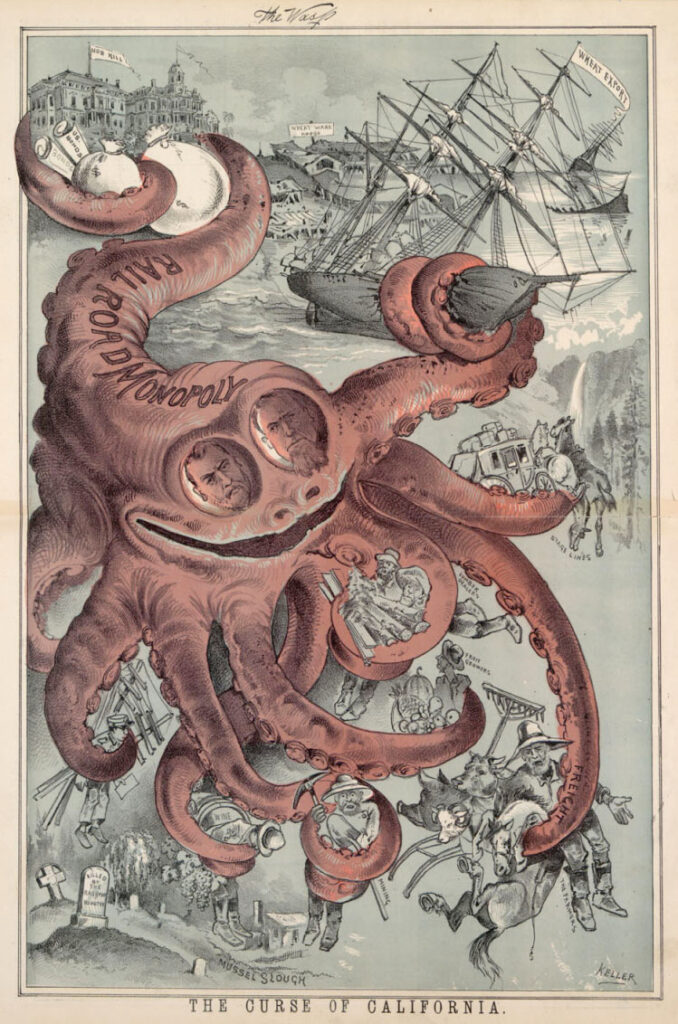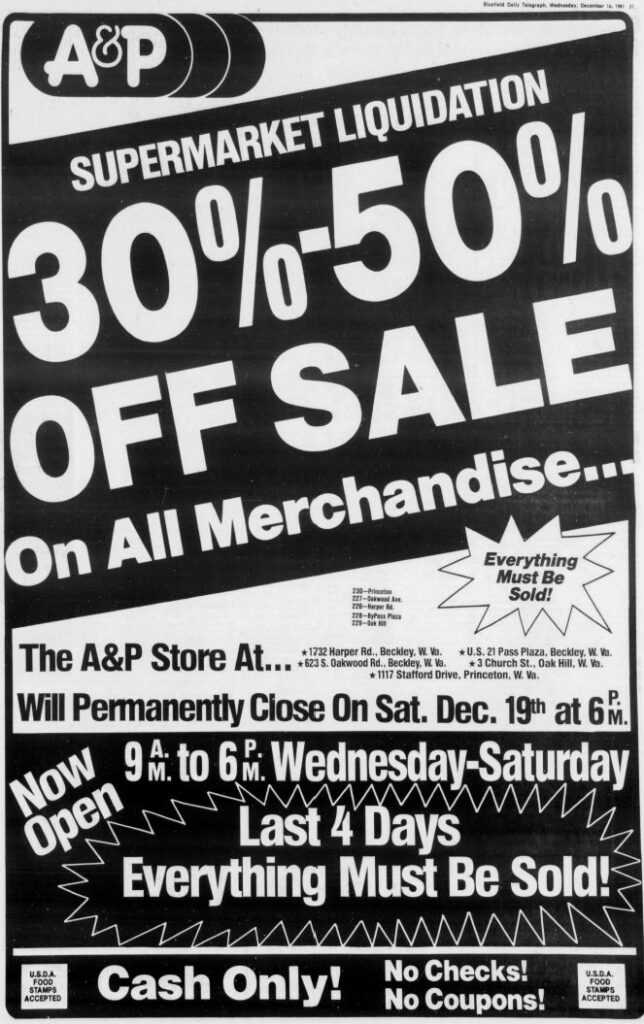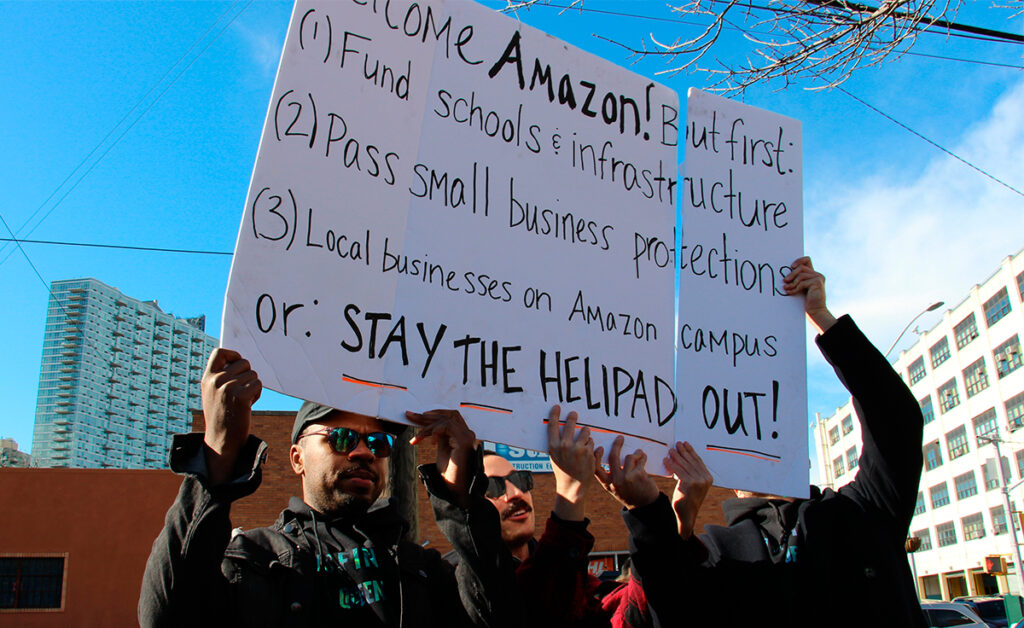The Rising Anti-Monopoly Movement: Overcoming Economic Tyranny
Bioneers | Published: June 26, 2024 Eco-Nomics Podcasts
Today, three to five giant corporations control up to 80% of almost every industry and marketplace. These monopolies depress wages, exploit workers, and decimate small businesses. Stacy Mitchell from the Institute for Local Self Reliance has been a leader in a growing anti-monopoly movement with a broad political base. Can this emerging movement – along with bold federal antitrust action – create a force that can challenge corporate power for the first time in decades?
Featuring

Stacy Mitchell, a writer, strategist, and policy advocate whose work focuses on dismantling concentrated corporate power and building thriving communities and a healthy democracy, has played a leading role in today’s growing anti-monopoly movement. She is Co-Executive Director of the Institute for Local Self-Reliance (ILSR) and the author of Big-Box Swindle: The True Cost of Mega-Retailers and the Fight for America’s Independent Businesses, and co-author of the influential report: Amazon’s Stranglehold.
Credits
- Executive Producer: Kenny Ausubel
- Written by: Kenny Ausubel
- Senior Producer and Station Relations: Stephanie Welch
- Program Engineer and Music Supervisor: Emily Harris
- Producer: Teo Grossman
- Host and Consulting Producer: Neil Harvey
This is an episode of the Bioneers: Revolution from the Heart of Nature series. Visit the radio and podcast homepage to find out how to hear the program on your local station and how to subscribe to the podcast.
Subscribe to the Bioneers: Revolution from The Heart of Nature podcast
Transcript
Neil Harvey (Host): In this episode, Stacy Mitchell explores a renaissance of bold federal anti-monopoly actions and popular movements. This non-profit leader, author and bane of Amazon and corporate monopolists says that – for the first time in a half-century – overcoming economic tyranny has a growing popular political base that unites Americans in the ongoing quest for a fair and democratic economy and society.
I’m Neil Harvey. This is “The Rising Anti-Monopoly Movement: Overcoming Economic Tyranny” on the Bioneers: Revolution from the Heart of Nature.
Stacy Mitchell (SM): I want to start with a paramount question of our times: How can we, as a country, find the ability to govern ourselves? How can we make decisions collectively? How can we solve our problems? How can we save ourselves before it’s too late?
I want to suggest to you today that the roots of this predicament lie in a decision made 40 years ago when leaders of both political parties agreed to abandon our anti-monopoly laws, laws that for generations had checked corporate power.
This decision was sold to us on the grounds that it would create a more efficient economy, that it would be good for consumers. It was sold to us, in other words, as having nothing at all to do with freedom and self-government.

Host: That’s Stacy Mitchell, co-executive director of the nonprofit Institute for Local Self-Reliance. For decades, she’s played a leading role in today’s growing grassroots anti-monopoly movement. Her insights about the importance of small independent business and community-oriented alternatives have shaped the thinking of a wide range of policymakers, scholars and advocates… She has written for The New York Times, The Washington Post, Bloomberg, and The Wall Street Journal, as well as academic journals.
Astoundingly, as Stacy points out, three to five giant corporations control up to 80% of almost every industry and marketplace. These monopolies raise costs, lower quality and services, depress wages, exploit workers, and stifle innovation. They decimate small businesses and marginalized communities – AND democracy.
SM: Today, nearly everything we rely on—food, medicine, housing, credit, news, information—is controlled by a small number of corporations. We are every day subject to their arbitrary dictates and whims. We wait helplessly while the insurance company decides whether to approve a treatment. We submit to abusive employment conditions and pervasive surveillance.
Across the country, urban and rural communities alike find themselves at the mercy of distant boardrooms, their local businesses disappearing, their futures no longer theirs to control. Is it any wonder that democratic institutions are seen by many as illegitimate?
We all know that the actions of government more often reflect the priorities of corporate executives than the needs of citizens. Across this land, there is a pervasive sense of powerlessness, and powerlessness leads to terrible places. It leads to apathy and despair and withdrawal; it leads to a longing for a strong man. Powerlessness is poison in the veins of a democracy.
There is an incredible growing anti-monopoly movement across this country that is making real strides in resurrecting our antitrust laws.
News Anchor: A day of protest in New York City over the location of an Amazon headquarters in Queens. The group against the move says ‘it’s angry that the governor and mayor ponied up nearly 3 billion dollars in taxpayer paid incentives to lure the 8th biggest corporation in the country to New York City.
Protestors: Hey-hey, ho-ho, Amazon has got to go…
Protestor: We have been concerned for many many years about these secret deals that are cut and public money and public property just given away.
SM: This movement stretches from the grassroots to the highest levels of government, where leaders of key agencies are dusting off long dormant antitrust laws and using them to rein in corporate power and expand the freedom and agency of ordinary people.
Antitrust is essential to democracy’s basic design. Just as we have checks and balances to prevent any one branch of government from wielding too much power, anti-monopoly laws prevent the accumulation of economic power. The notion that economic liberty is crucial to political liberty is an idea that originated on this continent. English colonists learned this concept from the Haudenosaunee people of the Northeast whose ideas infused the American Revolution. It was understood that tyranny could arrive not only in the form of a king, but it could also manifest as a global corporation.
Host: The British East India Company was the first modern corporation, chartered in 1601 by the British monarchy. By the 1770s, it had monopolized the lion’s share of the world’s trade with Europe.
One of the corporation’s monopolies was tea, the popular beverage of choice, along with alcohol. Because smugglers supplied half the tea to the colonies and sold it cheaper, the British Parliament passed the Tea Act, enabling it to undersell the smugglers while also paying pirates to destroy their ships.
Once the British East India Company eliminated its competition, it locked in predatory pricing. Until, that is, in 1773, the famed Boston Tea party famously dumped a million dollars’ worth of corporate tea into Griffin Harbor. In other words, the Boston Tea Party was actually an anti-monopoly rebellion that would soon trigger the American Revolution.
In many ways, the story of the United States ever since has been the ongoing battle between democracy and corporate economic tyranny.

SM: After the revolution, restrictions on corporate power were embedded in state laws, but that approach broke down in the 19th century when a group of men harnessed a disruptive new technology—the railroad. Control over the rails meant control over who could access markets. If you could monopolize the rails, you could monopolize every other industry.
The railroad giants also used their power as gatekeepers to impose exorbitant fees on farmers and small businesses, effectively taxing the entire economy, a form of kind of private tax.
These abuses sparked a widespread grassroots anti-monopoly movement. It led over the following decades to the passage of our first antitrust laws. The central purpose of these laws was to protect everyday people from concentrated economic power, or what Franklin Roosevelt would later call industrial dictatorship.
Indeed, it’s FDR who gets credit for fully activating our antitrust laws. He campaigned on a promise of economic freedom for the wage earner and the small business and the farmer. He launched a period of aggressive antitrust enforcement that lasted for decades. The government blocked mergers, they filed monopolization cases, and they periodically broke up companies for several decades.
Host: Following World War II, strong federal antitrust enforcement remained center stage, epitomized by the epic breakup of the nation’s biggest supermarket chain, A&P.
SM: At the time, it was the fifth largest corporation in the country. It was using a set of predatory tactics to knock competing small grocers, local grocers out of the market. And as it amassed market power, it became increasingly abusive towards its workers and to the farmers that supplied it. The government filed suit and it ultimately won that case, putting an end to A&P’s predatory tactics, and forcing the company to spin off parts of its operation.

Now A&P didn’t disappear, it continued to operate for decades, but it can no longer bully and dominate. And the results were striking. Its workers, with A&P back on its heels, its workers were finally able to form unions, farmers had more leverage and were able to negotiate better prices, and crucially, independent grocery stores flourished, accounting for more than half the market in the ‘50s and ‘60s.
Host: The prosperous post-war period from 1945 to about 1970 marked a qualitative reduction in economic inequality. There was a proliferation of small businesses, rising union membership, and the emergence of a thriving middle class.
Even despite systemic racial discrimination and exclusion, the income gap between Black and white citizens narrowed significantly. Record numbers of Black Americans joined unions, while Black-owned businesses multiplied. There were more Black-owned businesses in 1969 than there are today. Those businesses played a pivotal financial and organizing role in the civil rights movement, part of the historic surge at the time of movements for justice, democracy and human rights.
And because economic power helps build political power, inevitably it was bound to provoke a plutocratic backlash.
SM: The turn came in the 1970s, amid the confusion of oil shocks and inflation, a new faction rose within the Democratic Party. It cozied up to Wall Street and distanced itself from farmers and small businesses. And then in 1978, Robert Bork—yes, that Robert Bork, who you might know as Nixon’s solicitor general and later failed Supreme Court nominee, whose shadow over our lives was cast much more profoundly by this incredibly influential book that he wrote, in which he declared that the antitrust laws had nothing at all to do with questions of power and liberty; their sole purpose was to maximize efficiency and to lower prices.
Big business saw an opening, and Bork’s followers swept into power with Ronald Reagan. What followed was something akin to a coup. There wasn’t enough support to repeal the antitrust laws. All of the laws are still on the books today. Instead, Bork’s followers worked inside the Justice Department and the Federal Trade Commission to write new interpretations of the laws. They ignored the plain language of the statutes, they ignored the clearly expressed intentions of Congress, and they declared that antitrust had one goal, which was to lower prices. They also insisted that big companies were naturally more efficient and, therefore, we should welcome consolidation. They turned antitrust on its head.
Host: The corporate coup that Stacy Mitchell describes had actually been seeded in 1971 when the public’s view of big business was at rock bottom.
The prominent tobacco and corporate lawyer Lewis Powell penned a secret memo that sounded a call to arms for big business to roll back the gains of the New Deal and President Johnson’s Great Society programs. Its central goal was to end government regulation of business altogether.
After Powell’s memo caught fire in conservative legal and political circles, President Nixon appointed him to the Supreme Court in 1972. There, Powell unleashed a tip-of-the-spear conservative legal movement to capture the courts. A relentless national PR campaign soon followed, igniting a culture war that exalted the omniscience of the mythic “invisible hand of the market.”
Once Bork had set the table to distort the interpretation of antitrust laws, the Reagan administration upended them, along with enforcement. That corporate coup led to today’s bloated monopolies and unparalleled extremes of inequality.
SM: I came to this issue in the late 1990s, when I took a job at the Institute for Local Self-Reliance, the organization that I now co-lead.
One of my first assignments was to look at why local retail businesses were closing in droves. And the answer, I found, was that Walmart was using a set of underhanded tactics, very similar to those that A&P had used. It would come into a town, sell goods below cost, and then once the local competition had disappeared, it would raise prices. And as it gained market power, it began to strong-arm suppliers. It would say, you’re going to give us lower prices, better terms, more access, while you charge higher prices to the local grocer down the street.
I remember thinking, don’t we have laws against this? And so I started looking into antitrust, and, sure enough, in 1936, Congress passed a law that prohibits big retailers from exploiting their control over suppliers to undermine their smaller competitors. I found that in 1950, having witnessed how monopoly control of industry fed the rise of fascism in Germany, Congress passed the anti-merger act, a law designed to stop mergers. Reading these laws was like entering into an alternate universe. The word “efficiency” does not appear anywhere in the statutes. Instead, the concept you see over and over again is fairness.
Today, Walmart captures one of every four dollars that Americans spend on food. Walmart and other big supermarket chains, together with food conglomerates like Conagra and Tyson, have created a choke point in our food system. They are driving down the incomes of farmers and food workers while jacking up prices to consumers. It’s the same story everywhere.
Host: Yet by the early 2020’s, once again the big wheels were turning in the battle between democracy and corporate rule. When we return, how a renaissance of anti-monopoly laws and enforcement is challenging the corporate coup. I’m Neil Harvey. You’re listening to The Bioneers…
Host: By 2024, a large majority of Americans harbored negative views of big business and expressed support for strong antitrust laws with increased penalties and enforcement.
Federal and state antitrust actions surged in the wake of skyrocketing inflation from the Covid pandemic’s supply chain disruptions. Yet somehow, during this dire period of severe economic contraction, the largest corporations managed to smash their all-time profit records.
It turned out that about 60% of the spiking inflation could be attributed to corporate “greedflation”. Behind it was illegal monopolistic collusion. Companies secretly coordinated by sharing proprietary pricing data in order to charge the highest prices the market would bear. This illegal practice became systemic across the economy. But for the monopolists, the societal harm they cause is just roadkill.
SM: Over the last 20 years, big hospital chains have bought and closed one-quarter of the nation’s hospitals, with dire consequences for rural, Black and Indigenous communities. Meanwhile, if you live in a metro area where the hospitals have merged, not only do prices rise, but mortality rates go up for patients. Electric utilities have been on their own merger spree and are now using their enhanced market power to thwart the spread of distributed solar. We have planes falling apart in midair, a direct consequence of allowing Boeing to its only U.S. competitor in 1996.
Extreme inequality was one spark that led to today’s anti-monopoly movement. The other was the dawning realization that concentrated corporate power is a form of tyranny. All those years we worried about big government, big business was taking over. The realization finally came with the rise of big tech.
Host: The apex predators of contemporary monopolies are the Big Tech corporations. Google, owned by Alphabet, controls 90% of the search market. Meta commands 80 percent of social media. Amazon dominates a decisive majority of the gargantuan online shopping market
The Federal Trade Commission case against Google became the first major monopoly action in 25 years. The dramatic trial revealed that Google preserved its monopoly by illegally paying Apple over $26 billion to be its default browser. Subsequent federal antitrust actions have resulted in similarly epic cases against the brazen monopolistic practices of Amazon, Apple and Meta.
According to polls, about half of Americans across the political spectrum- want to break up big tech.
SM: The tech companies have followed the exact same playbook as the railroad barons: gain control of the underlying infrastructure of commerce, use your power as a gatekeeper to privilege your own interests, crush your rivals, and siphon off the revenue rightfully earned by others.
We have half as many local newspaper reporters in this country as we had 15 years ago. It’s not that people aren’t reading the news, and it’s not that advertisers aren’t buying ad space next to those articles, it’s that Meta and Google are pocketing all of those ad dollars.
Amazon controls two-thirds of online shopping traffic. That means virtually every business that makes or sells any consumer product has two choices, and both are usually fatal. You can either decide not to sell on the online market, or you can sell on Amazon’s platform. To sell on Amazon is to be subject to the tech giants’ bullying, its tendency to copy your best-selling products, its arbitrary algorithm changes that can tank your business.
Ten years ago, small businesses selling on Amazon paid Amazon fees equal to 14% of their sales. Today, Amazon is pocketing half of every dollar sellers earn. [AUDIENCE RESPONDS] Amazon generated $140 billion in seller fees last year. That’s more revenue than Meta. It’s more revenue than Bank of America. When businesses push back, Amazon routinely buries them in the search results. It has the power to regulate, to punish, to tax. This is a governing power. We cannot let them have it.
Amazon is extending its tentacles in every direction. Its package delivery operation is now bigger than that of the U.S. Postal Service and threatens to supplant it. Its cloud division powers much of the Internet. It’s advancing into healthcare and finance. It’s selling surveillance and AI technologies to police and military outfits around the world.
You may recall that in 2017, Amazon launched a sweepstakes in which cities offered billions of dollars in subsidies to win the company’s second headquarters. Mayors across the country created videos in which they bowed down before Bezos. [AUDIENCE RESPONDS] And when the company accepted a multi-billion dollar offer to locate in New York City, people rose up, and against the odds defeated the deal. [APPLAUSE]

It was one of the first green shoots of a budding anti-monopoly movement that quickly began gathering converts—labor leaders, small business groups, community activists, academics, members of Congress, and to the surprise of many, including me, one of those converts was Joe Biden.
A few months into his presidency, he gave a pivotal speech in which he repudiated Bork. “We’re now 40 years into an experiment of letting giant corporations accumulate more power. I believe that experiment has failed,” he said. He appointed some of the movement’s key leaders to top positions—Lina Khan, the head of the Federal Trade Commission; Jonathan Kanter, the DOJ’s antitrust division; Tim Wu at the National Economic Council. These cases are not about making small fixes on the margins. They aim to fundamentally restructure dangerous business models and restore our digital markets.
News Anchor: President Biden launching an assault on monopolies, he signed a massive Executive order today taking on industries like big tech, healthcare, airlines and agriculture. The White House says the goal is to promote competition.
President Biden: What we’ve seen over the past few decades is less competition and more concentration that holds our economy back. Rather than competing for consumers, they are consuming their competitors. Rather than competing for workers, finding ways to gain the upper hand on labor.
SM: The FTC is now reinvigorating a long-lost responsibility it has under the law to ban “unfair methods of competition.” Its first move is a rule that would ban non-compete clauses.
News Anchor: The FTC says 30 million people, about 1 in 5 workers, are subject to a non-compete agreement. Proposed last year, supporters claimed those agreements harm workers by reducing the ability to switch jobs for higher pay. The cause spans multiple career fields, from casino workers to doctors and even journalists.
Host: By 2024, the Federal Trade Commission had challenged over 40 mega-corporate mergers. As a result, about half were abandoned entirely, while the government won numerous cases blocking others outright. The rap sheet of industries facing major antitrust prosecutions continued to grow steadily.
Stacy Mitchell testified before Congress, which cited her research in an investigation concluding that Amazon has monopoly power. Her work also informed the FTC’s antitrust lawsuit against Amazon. And The New York Times highlighted her report Amazon’s Stranglehold as a roadmap to rein in the ecommerce colossus.
SM: What these leaders are doing is incredibly popular. Three-quarters of both Democrats and Republicans believe that large corporations are having a negative impact. More than that, anti-monopoly has a real live political base.
Ranchers and slaughterhouse workers are urging action against meatpackers. Small business groups have joined with warehouse workers to demand a breakup of Amazon. Local grocers are pushing for a level playing field. Nurses and patients’ groups are fighting healthcare monopolies. These voices are one reason that the U.S. Chamber of Commerce, try as it might, has been unable to gain any traction in Congress to try to put a stop to what these leaders are doing, to what we are doing.
Host: As encouraging as these gains are, inevitable changes in the political world assure they’re tenuous. But clearly the anti-monopoly movement has a real political base it hasn’t had in decades.
The Institute for Local Self-Reliance produced an action-oriented guide called “Fighting Monopoly Power” that details actions states and local communities can take – and are taking.
Local communities as well as national groups across the country have now joined forces in a coalition called Athena that Stacy Mitchell co-founded. It’s designed to oppose Amazon from the ground up, while creating economic democracy, addressing the climate crisis, safeguarding communities from surveillance, and expanding democracy.
SM: This movement is shaking up the political map, it’s fostering new alliances between labor and small businesses. It’s doing the crucial work of defining a common enemy, a shared culprit for what ails us, and thereby helping to steer us away from the politics of scapegoating and hate.
I want to be honest with you. I don’t know if this movement can outrun the forces of authoritarianism, but I think it’s the best chance we have, which is why I’m here. We need you. We need you to join us.
Imagine if we leveled the playing field. Imagine if grocery stores like this could open across the country in places that need them. Imagine if we took our healthcare system out of the hands of monopolists. Imagine if we took the corporate boot off the neck of rural America. [APPLAUSE] Imagine if we fixed the Internet. [AUDIENCE RESPONDS] This is what democracy looks like. It looks like government taking seriously its obligation to check economic power. It looks like all of us building the country, the economy, the future we want. We can win this, but we need you. We need you to tell your friends. We need you to join this fight. Thank you. [APPLAUSE]
Host: This is what democracy looks like… Stacy Mitchell, “The Rising Anti-Monopoly Movement: Overcoming Economic Tyranny”.








